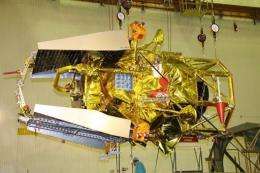Russian craft embarks on voyage to Mars moon (Update)

A Russian probe on Wednesday set off on a three year return mission to Mars that aims to bring the first sample of a Martian moon back to Earth and re-establish Moscow as a power in planetary exploration. The Phobos-Grunt probe blasted off from the Baikonur cosmodrome in Kazakhstan on a Zenit-2SB rocket in what Russia hopes will be its first successful planetary mission since the collapse of the Soviet Union.
The hugely ambitious mission aims to place the craft in orbit around Mars, land a probe on the surface of its largest moon Phobos, scoop up a soil sample and then bring the first ever sample of the Martian satellite back to Earth.
The initial stages of the spectacular night launch went smoothly, mission control said in a live relay provided by the Russian space agency Roscosmos.
The probe went into an initial Earth orbit from which it will start its route to Mars in the next hours.
"We know that it is a risk," admitted Roscosmos head Vladimir Popovkin, saying that 90 percent of the craft consists of completely new equipment as Russia had done almost nothing in this field for 20 years.
"Some 700 tonnes are going to lift off from the Earth but we are going to return a 50 gram sample" he added, in comments run by the Interfax news agency.
Moscow is desperate to show it can be a superpower in space exploration and is still inspired by the daring spirit of first man in space Yuri Gagarin, in the year it celebrated the 50th anniversary of his historic voyage.
But Phobos-Grunt will have to overcome the apparent jinx of the Soviet Union and Russia's botched attempts to explore Mars and its two moons.
The USSR sent up a string of probes to the Red Planet but most failed in their missions, at a time when NASA was able to impress the world with the stunning images from its successful Mariner and Viking probes.
Post Soviet Russia endured one of its most humiliating space failures in November 1996 when its Mars-96 probe broke up after launch in a disaster that appeared to symbolise the disintegration of the Russian space programme.
Stung by that catastrophe, Russia has not attempted a single planetary mission until now, leaving solar system exploration the preserve of NASA which has sent probes out to the furthest-flung planets of the solar system.
Moscow's last successful planetary mission were the Vega 1 and 2 probes of 1986 in the Soviet era which explored Venus and Halley's Comet.
If all goes to plan, Phobos-Grunt should reach Mars next year and then deploy its lander for Phobos in 2013, scooping a chunk of its surface before returning the sample back to Earth in August 2014.
In a landmark space cooperation between Moscow and Beijing, the probe is also expected to deploy a Chinese satellite, Yinghuo-1, which will go into orbit around Mars and observe the planet itself.
Phobos, which orbits Mars at a radius of just under 10,000 kilometres, is believed to be the closest moon to any planet in the solar system and scientists hope it will reveal secrets about the origins of the planets.
Phobos and the other Martian moon Deimos are relatively small, irregularly shaped rocky bodies that scientists believe still carry traces of the earliest stages of formation of the solar system.
The voyage also comes as the world's space powers are showing renewed interest in the possibility of sending a man to Mars in the next decades, possibly in the 2030s.
Last week six men emerged from 520 days in isolation in Moscow after an unprecedented experiment that attempted to test the psychological and physiological effects of a return trip to Mars.
Russia is planning an unmanned mission to the moonm a programme called Luna-Glob, in 2014 and may in the 2020s send a probe to Jupiter's moon Europa which is seen as one of the likeliest places for hosting life in the solar system.
(c) 2011 AFP





















